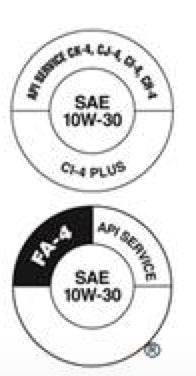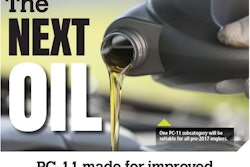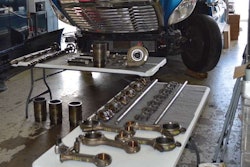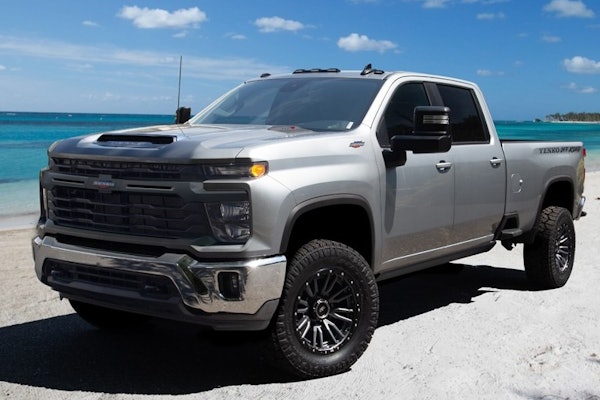 Last week Shell unveiled its new heavy duty diesel engine lube oil products that conform to the API performance standards due to take effect December 1.
Last week Shell unveiled its new heavy duty diesel engine lube oil products that conform to the API performance standards due to take effect December 1.
If you don’t spend much time reading the labels on the oil you buy for your diesel trucks and equipment, it’s time to start paying close attention.
For the last 10 years most of you have been putting what’s known as CJ-4 lube oil into your diesel engines. That’s about to change.
Starting in December, the industry will begin transitioning to a pair of new oil formulations CK-4 and FA-4 (as designated by the American Petroleum Institute). And by this time next year almost all of you will be using one of these two new types of oil as the inventories of CJ-4 oils are used up.
Last week Shell Oil invited us to Washington D.C. for a briefing on what this change means for contractors and the trucking industry.
“Historically a lot of our customers have asked for their oil by saying ‘I want Rotella 10W-30 or 5W-40,” said Dan Arcy, global OEM technical manager Americas. “They need to go one step further now and say ‘I need Rotella 10W-30 CK-4 or Rotella 10W-30 FA-4’ to make sure they’re getting the correct product for their applications.” The two different types of oil meet the same performance criteria but are designed for very different engine types.
Evolution of oil standards
 Diesel engines that conform to the standard will display a new API “donut” with the CK-4 oils (top) showing a split and backward compatibility, and the type on the FA-4 symbol reversed to make it stand out more.
Diesel engines that conform to the standard will display a new API “donut” with the CK-4 oils (top) showing a split and backward compatibility, and the type on the FA-4 symbol reversed to make it stand out more.Ten years ago the industry developed a new lube oil standard called CJ-4 in response to the tough operating conditions created by emissions technology for diesel engines. Then about five years ago the Association of Engine Manufacturers went to the API and the oil companies and asked them to start working on a new formula that would:
- Offer greater performance benefits.
- Provide better fuel economy for on-highway trucks
- Address issues related to the continuing evolution of emissions technology.
Now, with millions of miles of highway testing and millions of hours of off-road trials, the development phase is over and for the first time the industry now has a split category.
CK-4 oil will go into off-road equipment, older on-road engines, vocational trucks, diesel pickups and medium duty trucks. FA-4 will be used in newer model on-highway trucks looking to improve fuel economy with a lower viscosity formula.
To date no off-road or vocational truck OEMs have approved FA-4 for their engines, although that could change in the future, says Arcy. There is also some concern that the thinner viscosity oils may not work well with older models of highway trucks, so for these engines CK-4 will work just fine.
“No off-highway manufacturer has said anything to me about recommending FA-4 products at this time,” said Arcy. “Maybe in the future. And none of the diesel pickup truck manufacturers will be recommending the FA-4 products for now.”
If you’re in doubt about which product to use, consult your truck or equipment OEM.
Performance boost
The new CK-4 and FA-4 oils are equal in one regard. Both provide better performance in three main areas:
- Oxidation protection. Heat breaks down engine oil, a process known as oxidation. All the newer engines, on- and off-road are running hotter than previous generations of engines. The oil companies used the new oil standard as an opportunity to improve oxidation protection.
- Aeration control. A certain amount of air gets churned up into the oil as an engine is running, especially in off-road equipment. It’s important that those air bubbles disperse as quickly as possible, otherwise you get a loss of lubrication and reduced performance in the engine. To be certified, the CK-4 and FA-4 oils must pass a more stringent aeration control standard than the previous generation of CJ-4 oils.
- Shear stability. The high speed movement of metal parts in an engine can permanently “shear” or break apart the molecules in an oil, causing a loss in viscosity. The new oils are formulated to better resist this action.
When it comes to viscosity choices in the CK-4 formulations, stick with what you’re using in the CJ-4 oils. “If you are using a 15W-40 CJ-4 oil today, you’ll use a 15W-40 CK-4 oil when it becomes available,” says Arcy. “They are fully backwards compatible in the viscosity grades we have today.”
Fuel economy
The fuel savings for approved on-road engines using FA-4 are considerable, industry-wide figures cite potential savings of 2-4 percent.
The on-highway market uses about 37 billion gallons of diesel every year,” says Arcy. “If we can save just one percent of that, it comes out to about a million gallons a day in fuel savings. At today’s diesel prices of $2.20 a gallon that’s $2.2 million dollars every day in savings.” And since burning a gallon of diesel creates 20 pounds of carbon dioxide, a 1-percent savings in fuel economy in highway trucks nationwide could keep 20 million pounds of greenhouse gasses out of the atmosphere every day.
In addition to introducing its CK-4 and FA-4 formulations, Shell is also rolling out a new base oil product for its synthetic and semi-synthetic blends. Called Pureplus, this new base oil is made from a gas-to-liquids (GTL) process that creates a highly pure form of base oil. According to the company this high quality base oil has a higher viscosity index, lower volatility, better low temperature properties and better oxidation stability. The Pureplus synthetics will be available in the Rotella T5 and T6 products.











